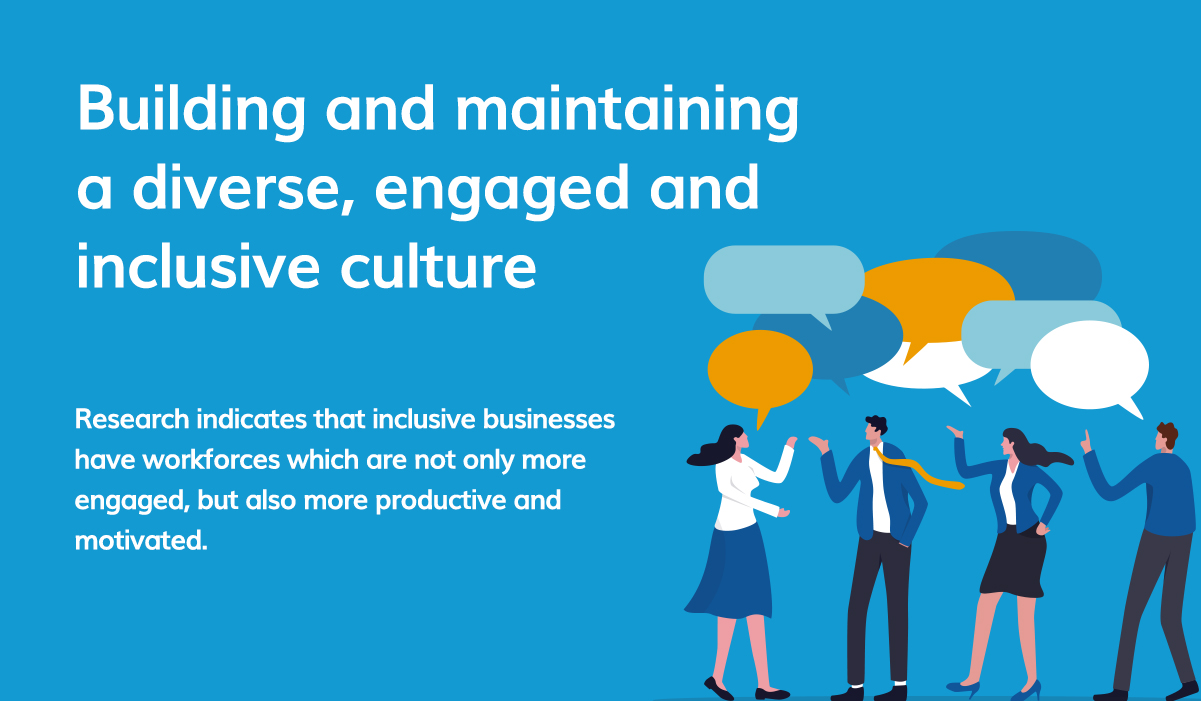Everyone performs at their best and happiest when they can be themselves. We all want to be valued for exactly who we are. Differences at the place of work are a positives which should be celebrated. People from different backgrounds, cultures and experiences will bring more to the table and make the company stronger. Research indicates that inclusive businesses have workforces which are not only more engaged, but also more productive and motivated.

What do we mean by inclusivity?
Inclusivity is “the practice or policy of providing equal access to opportunities and resources for people who might otherwise be excluded or marginalized, such as those having physical or mental disabilities or belonging to other minority groups” (Google’s definition via Oxford Languages). An inclusive culture will allow employees to not only get employed but to be successful. Regardless of sex, race, gender, first language, religious background, age, physical ability and/or sexual orientation.
People from all backgrounds are entering the workforce, and with each new group of individuals comes a new set of insights that was previously unknown and untapped. Deloitte reports that inclusive workplaces are six times more likely to be innovative. Here are some tips to encourage and nurture a more inclusive culture.
It needs to start from the top
Inclusivity should be prioritised at C-level. If they are all middle-aged males, they will offer a middle-aged male’s perspective and that is that. C-suite executives should be educated on the importance of inclusivity and fully embrace it. It is no use running training courses for lower-level employees if the higher-ups do not truly believe and understand an inclusive culture. It also allows a safe space for leaders to blurt out what are perhaps embarrassing or awkward questions behind closed doors, avoiding public gaffes, educating themselves and unlearning certain beliefs. Once leaders are on board and feel comfortable, the company can set and prepare inclusivity initiatives that are embraced by all and therefore, authentic.
Make your policies inclusive
If the policymakers are not diverse you will find yourself hard-pressed to build and form policies which are inclusive and understanding of different realities. Ask for suggestions and feedback from employees from all levels, company-wide. Hold regular surveys and feedback sessions and work it into the regular employee reviews. This will ensure that additional perspectives build more holistic and inclusive policies and values.
Encourage a culture of one-on-one conversations
Connected to the previous point, one-on-one meetings shouldn’t be reserved solely for performance reviews or work feedback. There should also be an open dialogue that leaves an opportunity for transparent and honest conversation for employees to discuss challenges they may be facing – particularly those they may feel uncomfortable to talk about publicly. Also, leave an open suggestion box for employees to leave anonymous tips and suggestions as an opportunity for them to provide feedback on sensitive topics. In a bilingual country like Malta, being aware that an employee is more comfortable in a particular language than in another will allow them to speak freely in the language they are most communicative in. Remind them that they are not judged based on the language they speak and their preferred language does not reflect their ability to get the job done.
Note your language
As a decision maker or HR professional, the way you talk will speak in bucket loads. Make sure your language is inclusive – use the preferred pronouns, use general terms like “partner” or “significant other” rather than “husband” or “wife”. Do not make assumptions about anyone. Avoid gendered words like ‘salesman’. Do not refer to female workers as ‘girls’. Be aware of your languages and be better.
Create an inclusive task force
Once you make sure the C-suite has embraced the inclusive culture, think about stakeholders whose input will be valuable in bringing the inclusivity culture into being. They should not only be passionate about diversity and inclusivity but they should also put in the effort to raise the bar in this regard and realise it. They will be responsible for bringing new initiatives to the table and communicating change. Most importantly, make sure the task force itself is diverse.
Think about what you are rewarding
What you reward directly translates to what the company values. Think about actions and initiatives which help your company culture be more diverse and reward them.
How accessible is your office?
Is the entrance/ kitchen/ boardroom wheelchair friendly? Can you provide nursing rooms for new mums? These are all questions that can be researched and seen to by yourself or by the inclusivity task force.
Be mindful of diversity and you’re on the right track. Don’t get caught up in the politics and judgements. Remind yourself as well as your colleagues that as long as an individual is open to learn and be better the job is half done.

